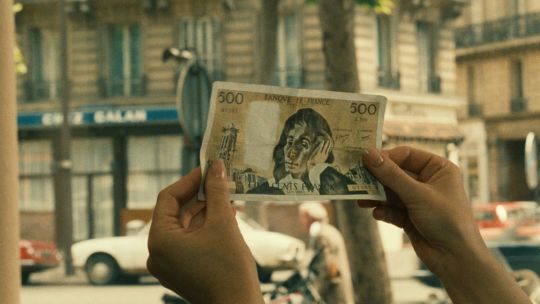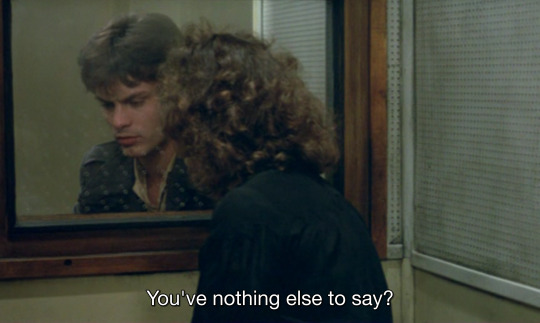#Vincent Risterucci
Photo

I thought dishonest people could get along.
L'Argent, Robert Bresson (1983)
#Robert Bresson#Christian Patey#Vincent Risterucci#Caroline Lang#Sylvie Van den Elsen#Michel Briguet#Béatrice Tabourin#Didier Baussy#Marc Ernest Fourneau#Bruno Lapeyre#Pasqualino De Santis#Emmanuel Machuel#Jean François Naudon#1983
0 notes
Text
40th Anniversary Movie Festival: L’Argent (1983)
Title: L’Argent
Release Date: 18 May 1983
Director: Robert Bresson
Production Company: MK2 Diffusion
Summary/Review:
A couple of wealthy kids, unable to get money from their parents, pass off a counterfeit bill at a photo shop. The shop owner, recognizing the money as counterfeit, has his employee, Lucien (Vincent Risterucci), use it to pay the oil delivery man, Yvon (Christian Patey). When Yvon…

View On WordPress
0 notes
Photo

Christian Patey in L'Argent (Robert Bresson, 1983)
Cast: Christian Patey, Vincent Risterucci, Caroline Lang, Sylvie Van den Elsen, Michel Briquet, Béatrice Tabourin, Didier Baussy, Marc Ernest Fourneau, Bruno Lapeyre. Screenplay: Robert Bresson, based on a story by Leo Tolstoy. Cinematography: Pasqualino De Santis, Emmanuel Machuel. Production design: Pierre Guffroy. Film editing: Jean-François Naudon.
When does style become mannerism? And why is it that style is generally thought of as a good thing, and mannerism is often a pejorative? I found myself pondering these questions while watching Robert Bresson's last film, L'Argent. Bresson is one of the directors I most admire, so my first impulse is to admire L'Argent as a superb example of Bresson's austere style: his willingness to let the audience decide what's going on within the characters by restraining his actors' displays of emotion, the simplicity of his mise-en-scène, his use of ambient sound to do the job that other directors rely on musical scores to accomplish. He has a fascinating premise to explore in L'Argent, which he adapted from a story by Tolstoy: the horrible repercussions of the passing of a counterfeit bill by some schoolboys. They spend the bill in a photography shop, buying a picture frame mainly to get some real money in change. When the fake bill is discovered, the shop owner passes it off in payment to Yvon (Christian Patey), the young driver of a heating-oil delivery truck. When Yvon is arrested for passing counterfeit money, he identifies the clerk at the photography shop, Lucien (Vincent Risterucci), who gave him the money. But Lucien perjures himself, saying he had never seen Yvon before, so Yvon is convicted. Though he's given a suspended sentence, he loses the job that he needs to support his wife and small daughter. Unable to find work, he agrees to act as the getaway driver for an acquaintance who's robbing a bank, but is caught and thrown into prison. Life in prison does him no good, especially after he learns that his daughter has died of diphtheria and his wife has decided to start a new life. When he lashes out at a fellow inmate he is thrown into solitary. He attempts suicide, but survives and returns to prison where he finds that Lucien is also an inmate, having robbed the photography store and become rich through various forms of larceny. Embittered, Yvon serves out his term and is released, but he continues his descent into criminality, murdering the keepers of a small hotel and robbing them, and finally finding shelter with an elderly woman (Sylvie Van den Elsen), whom he also murders, along with her entire household. At the end, he confesses and is returned to prison. Bresson's dry, understated telling of this story gives it a kind of dreamlike matter-of-factness that a more florid and violent version couldn't achieve. But there are also moments when you become aware of the way Bresson is telling the story, moments in which, I think, style becomes mannerism, especially if you've seen enough Bresson films to recognize his particular way of dramatizing events. For example, there is one scene in which the camera focuses on a passageway in the Paris Métro: What we see for a long time (perhaps only seconds, but it feels longer given our natural impatience to want things to happen in a movie) are the foot of a stairway, the concrete floor and tiled walls, and the beginning of a passageway to the trains. Bresson holds on this empty space as we hear the train arrive and the doors open and people make their way toward the space, through it, and up the stairs past us. He stays on the space until people -- they are Lucien and two of his friends -- come down the stairs past us and enter the passage. We hear the train doors close and the train depart, and only then does Bresson cut to the platform and the train entering the tunnel. It's a moment of no real narrative importance, but Bresson's holding us there as it happens crafts a kind of suspense, a kind of anxiety of the quotidian that informs the entire film. The only problem I have with the scene is the way it sticks in my memory as an inflection of style. And remembering this moment at the expense of others more important to the theme and narrative of L'Argent makes me think of it as mannered. While it's still a fascinating and challenging film, Bresson's deadpan actors and his focus on emptiness lend themselves easily to caricature and parody, and I think he carries them too far in L'Argent, never finding the balance that make his masterworks -- Diary of a Country Priest (1951), A Man Escaped (1956), Au Hasard Balthazar (1966) -- such essential films.
0 notes
Photo


L’argent -- Robert Bresson (1983)
#l'argent#leo tolstoy#robert bresson#1983#film stills#christian patey#vincent risterucci#french cinema#mine#drama#crime
4 notes
·
View notes
Text
12.14.19

#watched#letterboxd#film#l'argent#robert bresson#christian patey#vincent risterucci#sylvie van den elsen#michel briguet#caroline lang#marc ernest fourneau
1 note
·
View note
Text
L'Argent
L’Argent
L’Argent (1983) Written and directed by Robert Bresson Based on the short story “Faux billet” by Leo Tolstoy Starring: Christian Patey, Vincent Risterucci, Sylvie Van den Elsen, Marc Ernest Fourneau
A series of tragic events unfold with the careless passing of a counterfeit 500 franc note.
This film is based loosely on the Leo Tolstoy (Anna Karenina) short story “Faux billet” or “The Forged…
View On WordPress
#1983#Christian Patey#cinema#Film#foreign language#French#L&039;Argent#Leo Tolstoy#Marc Ernest Fourneau#Movie#Popular#Review#Robert Bresson#Sylvie Van den Elsen#Vincent Risterucci
0 notes
Text
Robert Bresson's L'ARGENT, 1983

Counterfeit money made by a couple of wealthy / bored teens works its way to an unsuspecting working class man, Yvon (Christian Patey), who becomes pinned for the forgeries. These false accusations and repercussive penalties ruin Yvon's life and family, but soon become overwhelming factors that substantially dehumanize his once mild-natured persona. A very cool and disrupting concept adapted to the screen. +_+
#Christian Patey#Vincent Risterucci#Caroline Lang#Sylvie Van den Elsen#Michel Briguet#Béatrice Tabourin#Didier Baussy#Robert Bresson#L'Argent
0 notes